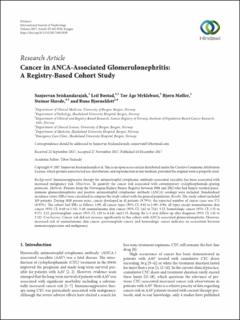Cancer in ANCA-Associated Glomerulonephritis: A Registry-Based Cohort Study
Sriskandarajah, Sanjeevan; Bostad, Leif; Myklebust, Tor Åge; Møller, Bjørn; Skrede, Steinar; Bjørneklett, Rune
Peer reviewed, Journal article
Published version

Åpne
Permanent lenke
https://hdl.handle.net/1956/17493Utgivelsesdato
2017-12-18Metadata
Vis full innførselSamlinger
Originalversjon
https://doi.org/10.1155/2017/6013038Sammendrag
Background. Immunosuppressive therapy for antineutrophil cytoplasmic antibody-associated vasculitis has been associated with increased malignancy risk. Objectives. To quantify the cancer risk associated with contemporary cyclophosphamide-sparing protocols. Methods. Patients from the Norwegian Kidney Biopsy Registry between 1988 and 2012 who had biopsy-verified pauci-immune glomerulonephritis and positive antineutrophil cytoplasmic antibody (ANCA) serology were included. Standardised incidence ratios (SIRs) were calculated to compare the study cohort with the general population. Results. The study cohort included 419 patients. During 3010 person-years, cancer developed in 41 patients (9.79%); the expected number of cancer cases was 37.5 (8.95%). The cohort had SIRs as follows: 1.09, all cancer types (95% CI, 0.81 to 1.49); 0.96, all types except nonmelanoma skin cancer (95% CI, 0.69 to 1.34); 3.40, nonmelanoma skin cancer (95% CI, 1.62 to 7.14); 3.52, hematologic cancer (95% CI, 1.32 to 9.37); 2.12, posttransplant cancer (95% CI, 1.01 to 4.44); and 1.53, during the 1–5-year follow-up after diagnosis (95% CI, 1.01 to 2.32). Conclusions. Cancer risk did not increase significantly in this cohort with ANCA-associated glomerulonephritis. However, increased risk of nonmelanoma skin cancer, posttransplant cancer, and hematologic cancer indicates an association between immunosuppression and malignancy.
